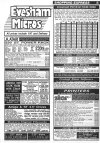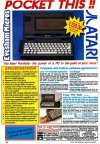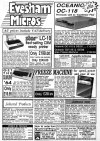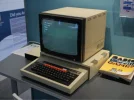Way back in the old days, when Dixons had High street shops, I had one of these.
View attachment 180652
Source:
https://i.pinimg.com/originals/a2/1b/be/a21bbe34d216fb7d509732b6f959f129.jpg
I had enough money left under the mattress to buy the lowest spec version, which was (wait for it) 512K.
I went into Dixons, but they hadn't got one in stock. The nice man behind the counter said "We have one of the top of the range 640K models in stock, with 2 floppy drives". And then the clincher, "You can have it for the same price". I suspect that it was their only stock, and they were glad to see the back of it.
It did have a good keyboard, but no other discernible redeeming features. The screen appeared to be dark green text on a light green background. I could hear the beads sliding about on the internal 4.77 MHz abacus. I passed it on to a friend. She gave it a week, (and remained friends), and passed it on I know not where.
Andrew.











